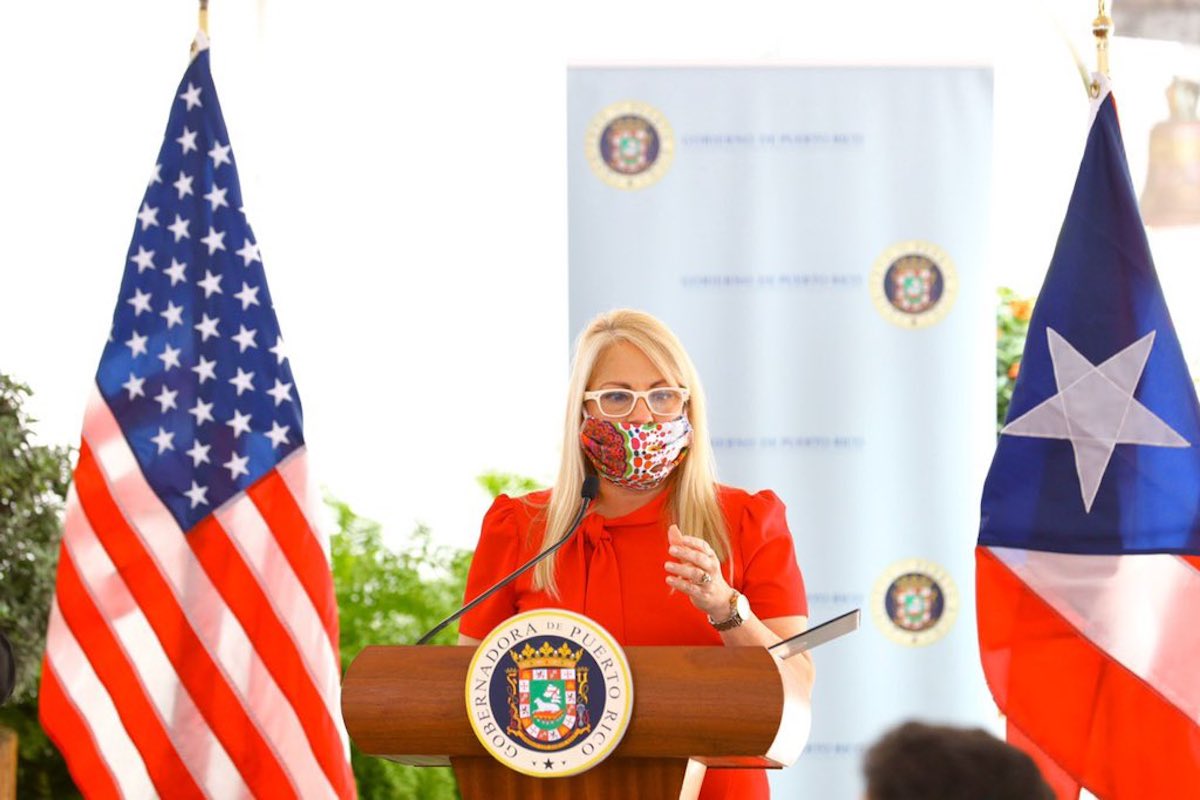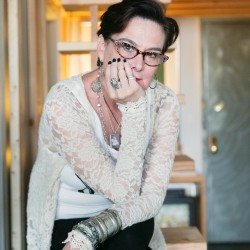

Gov. Wanda Vázquez in April (Photo via La Fortaleza)
Ignoring the dire warnings of her public health team, Puerto Rico governor Wanda Vázquez finally buckled under the pressure of the business community and opened much of the island’s economy, but at the same time had to extend the curfew because Puerto Rico braces for the peak of COVID-19 on May 9 and infection and deaths rates continue to rise.
As Puerto Ricans digested the latest Vázquez news on Thursday night through a pre-recorded message, a San Juan judge dealt a blow to Vazquez’s increasingly autocratic administration and suppression of the press, by ruling against the police and the Justice Department on the arrest of a local anti-hunger activist.
The judge ruled they had “no cause” to charge Giovanni Roberto with allegedly violating the lockdown order and obstructing justice.
Puerto Rico activist Giovanni Roberto has been released and all charges dropped. Judge find his arrest, during anti-hunger protest, to be unlawful. pic.twitter.com/pm1IMLWaDQ
— Yarimar Bonilla ??? (@yarimarbonilla) May 1, 2020
Roberto was forcefully arrested by police while protesting hunger on the island and the government’s stringent measures to keep people at home. Roberto, who distributes food to the needy and hungry, is now out of jail.
Vázquez, a Republican from the New Progressive Party (PNP) favoring statehood, opened the economy after a two-month lockdown and the strictest stay-at-home measures in a U.S. jurisdiction, and just a week after the head of the Task Force warned that it was too soon, the testing and tracking were not there, and people would die.
“No, no, there is no way,” Dr. Segundo Rodríguez Quilichini said. “If we lower our defense and we don’t take care, people will die.”
It is also unclear when the last time was that Vázquez met with the Task Force before her announcement.
Hace una semana el Director del Task Force Médico daba su opinión sobre la flexibilización de la cuarentena y el toque de queda. pic.twitter.com/5gx5Me3YjG
— Jesus Manuel Ortiz (@jmanuelortiz) May 1, 2020
On Thrusday night, Vázquez, surrounded by officials looking like Knights Templar in face masks, made the announcement through state televesion WIPR, where she has banned the presence of the press.
Journalists were left in the dark. Behaving worse than Donald Trump, Vázquez has used the pandemic as an excuse to block the press in order to control the COVID-19 narrative. It is an election year, and Vázquez, who was not elected by the voters of Puerto Rico last summer when she assumed the governor’s role in the post-Ricardo Rosselló resignation controversy, is trying to win her party’s nomination so that she can run for governor on Election Day.
Called Out
Last month, Rep Nydia Velázquez (D-NY) called Vázquez out.
“Not even the current President of the United States, with his long history of clashing with and attacking the media, has gone as far as steps recently taken by the government of Puerto Rico,” she said.
As of Sunday afternoon, Puerto Rico has reported 1,808 cases of the coronavirus and 98 deaths, but the data is riddled with errors. Health officials are accused of corruption, and the public health community has criticized Vázquez’s mishandling of the pandemic. The island has tested fewer than 12,000 people, the lowest per-capita testing rate compared to any U.S. state. The testing issue is so controversial that the government’s official dashboard is now not sharing the information.
This one is no longer being updated but it also listed how many tests were conducted, even though some of those tests were duplicated or even triplicated. pic.twitter.com/faUz2dR3Lo
— Julio Ricardo Varela (@julito77) May 3, 2020
In addition, a 5.4 earthquake rocked the island’s southerm region on Saturday, reminding Puerto Ricans that the constant frequency of seismic events hasn’t really stopped since last December.
On the face of this, it is difficult to comprehend Vázquez’s willingness to put the island’s residents’ lives at risk. It seems the pressure of the island’s private sector, which released a video campaign and circulated a signed letter by financial heads of state, to open the economy tipped the scale.
On Monday, May 4, according to the Vázquez administration, some sectors including finance and real estate will reopen. On May 11, construction and manufacturing will restart. Other businesses to open their doors will include laundromats, moving services, and those that repair elevators and air conditioning units. By the end of May, the retail trade, barbershops, and beauty salons will be allowed to operate.
The lockdown for everyone else will continue until May 25. The curfew will remain for the time being from 7 p.m. to 5 a.m.
Putting the onus on business owners and citizens, Vázquez said that “we must bear in mind that the increase or decrease in the risk of contagion will depend to a great extent on the collaboration of the citizenry.” She advised against the gathering of large groups, curtailing the right to protest.
Still, some protesters continue to be creative, as the recent placement of three pig heads near La Fortaleza showed.
Coño. Wow. #PuertoRico pic.twitter.com/0ZJ9yaZotM
— Julio Ricardo Varela (@julito77) May 1, 2020
Known Cases (and Hatred of Press) Keep Growing
Vázquez’s Thursday appearance coincided with the announcement of more than 100 new confirmed COVID-19 cases, one of the highest numbers since the lockdown was implemented in mid-March. The suppression of the press during this pandemic and lockdown is concerning. The fact that Vázquez has demonized journalists as a means to control the narrative is not only dangerous, its autocratic.
Furthermore, the government keeps moving the goal posts. At one point in early April, the government was talking about flattening the curve by the first week of May, which is this week. That has already changed.
Lorenzo González, @DeptSaludPR Secretary, now says that plateau of cases will be in early June. (Me: on Palm Sunday, he was talking about flattening the curve by early May)
— Julio Ricardo Varela (@julito77) April 15, 2020
“The word hatred [of the press) is not used incorrectly. We have been governed by two parties, in recent history, and what we see is when the PDP [the commonwealth party] is in power, they disguise it a little bit more. The reaction to our work as journalists, they are not as bothered by it,” veteran Puerto Rican journalist and anchor Nuria Sebazco told Latino Rebels. “But when it’s the PNP in power, the war against the press is much cruder, especially from their supporters. The haters are more visceral, the hate is stronger. I have been called a whore, and worse, and these insults are on a daily basis.”
“But in the press conferences, she [Vázquez] dug herself into a deeper hole. When they are journalists, she sinks herself more and looks worse,” Sebazco added.
Therein lies the issue.
By the way, Vázquez won’t talk to the press but will sit for an “interview” with La Comay, a puppet in drag voiced by Antulio “Kobbo” Santarrosa, who is a known PNP affiliate.
https://www.youtube.com/watch?v=AU2Hqy-wmLc
A Witness to a Media Witch Hunt
I witnessed firsthand the media witch hunt in Puerto Rico. For four years, I was the News Director for Univision Puerto Rico, at that time the most powerful media outlet on the island. It was a daily onslaught of politicians currying favor and attempting to influence coverage.
Working alongside the local press, I saw their courage, dedication, and long hours (with low pay) they put in every day. These are veteran journalists who take their jobs seriously, who investigate and analyze and are committed to the truth. They are also the target of the lowest forms of attacks by members of whatever party and government happen to be in power.
“When you eliminate journalism, independent journalism, you become a propaganda arm, And as a propaganda arm, in an election year, they have just shot themselves in the foot,” Yolanda Vélez Arcely, the host of Univision Puerto Rico Jugando Pelota Dura and one of the most respected journalists on the island, told Latino Rebels. “There are people that, even before Trump, injected from their microphones a visceral hatred of the press [in Puerto Rico]. And I am also talking about analysts that have premiere programming in the same media. [In Puerto Rico] this has been like this since the time of Maravilla. Remember that the Maravilla case was very difficult and if it had not been for the tenacity of the journalists that were going against the official story—like Manny Suarez and Thomas Stella the truth would have never been revealed.”
On July 25, 1978, police intelligence agents arrested two would-be nationalist bombers, tortured them, then killed them in cold blood on Cerro Maravilla, a 4,000-foot mountain in southern Puerto Rico. It was Puerto Rico’s Watergate.
“I began working as a journalist at that time and it would scare me to walk with my press badge because the police were a very corrupt body and the dynamic was one of confrontation with everything that was journalism,” she said.
“What there is in Puerto Rico against the press is a witch hunt, a campaign to discredit, and look down upon and minimize the work that we do,” Felipe Gómez, another well respected veteran anchor/reporter, told Latino Rebels.
Carlos Webber, a Chilean journalist and longtime resident of Puerto Rico, agreed.
The suppression of the media “is where you can see their slip showing because these people do not want stones in their path,” Webber said. “But they look very bad in front of the Puerto Rican people because this situation exploded in their face.”
Silencing of the press is concerning at any point in the life of a nation, but it is alarming in the middle of a pandemic and with an administration that puts its political and economic life over the safety of its own people, and in an election year.
As the late, great journalist Walter Cronkite said: “Freedom of the press is not just important to democracy, it is democracy.”
Right now in Puerto Rico that freedom is being seriously challenged.
***





[…] On this #WorldPressFreedomDay , @DurgaOne writes about the push by @wandavazquezg and @fortalezapr to destroy press freedom in #PuertoRico. https://www.latinorebels.com//2020/05/03/wandapressfreedom/ … […]
Media suppression in Puerto Rico has never surprised me. In fact it only proves that this continues as it has been for decades. ?
[…] that no one in Puerto Rico goes hungry. Ironically, during this demonstration, the police arrested Giovanni Roberto, founder of Comedores Sociales, and charged him with both violating the curfew and “obstruction […]